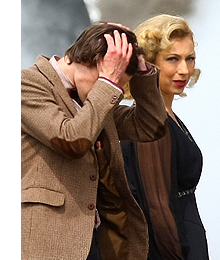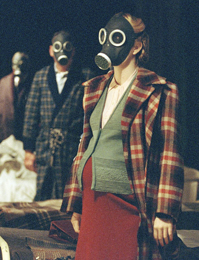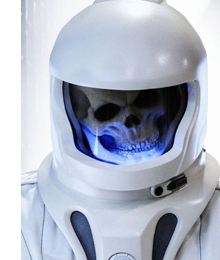 Doctor Who in 2010 is safe in the hands of Steven Moffat! Doctor Who in 2010 is safe in the hands of Steven Moffat!
No pressure there at all then...
Under Russell T Davies, you had two single episodes and two two-parters. How are they different to write?
The discipline of writing a 45-minute Doctor Who story is considerable. You’ve got an awful lot to do. You’ve got to get them out of the TARDIS, introduce a whole bunch of people, and a whole world of the story, and then dispose of it in under 45 minutes. That’s tough. With the two-parter, you have quite a bit more time. The reality is that this does not now mean we’re going to have more two-parters because the worst words in the world are “Part One” and “Part Two”. I know we don’t have them on screen though, but my kids are furious when it’s a two-parter.
When I approach a script I always think I’m going to have tonnes of time. I'm thinking about building up a relationship, and you realise of course when you get to the scene you’ve only got four lines. That’s what writing Doctor Who is like – you think “Oh I’ll have this idea and that idea. And they can chat about this and that” – And it’s nearly the end of the episode! A monster’s going to have to come in a rip someone’s head off.
Do you prefer writing a two-parter?
I probably actually do. It is harder to write something shorter. It's not hugely different. You've got a little bit more setup, I suppose, but you don't really want to use that because in Doctor Who you want to get straight into it. I suppose what's nice [in Silence in the Library] is, in quite an Old School way, we've got the two main characters wandering around for 12 minutes which actually works really well and allows you to have a few minutes before you get a whole bunch of characters introduced who have to start talking.
 I think the hardest think about the two-parter is the first section of episode two. That was the case with The Empty Child and it shows at the beginning of The Doctor Dances. If you cut them together it runs perfectly, it's like a movie, it's fine. But if you stop in the middle, wait for a week and go back, you do think they've been mucking about in that hospital being chased by Gas Mask People for an awful long time. It just feels wrong. So it is better I think to make it feel as though you're coming in at a different angle. I notice Russell hasn't done that with a two-parter since he did in Aliens of London and World War Three. World War Three starts off seconds after the first one, but he didn't do it again. Each time the story is ramped up or changed its angle, and I think it's a better idea. I think the hardest think about the two-parter is the first section of episode two. That was the case with The Empty Child and it shows at the beginning of The Doctor Dances. If you cut them together it runs perfectly, it's like a movie, it's fine. But if you stop in the middle, wait for a week and go back, you do think they've been mucking about in that hospital being chased by Gas Mask People for an awful long time. It just feels wrong. So it is better I think to make it feel as though you're coming in at a different angle. I notice Russell hasn't done that with a two-parter since he did in Aliens of London and World War Three. World War Three starts off seconds after the first one, but he didn't do it again. Each time the story is ramped up or changed its angle, and I think it's a better idea.
How much did you redraft those first scripts for the show?
Really, really proper actual different drafts, three for The Empty Child and four for The Doctor Dances. But if you count everything as a draft, it was something like sixteen or seventeen. I was doing stuff at the time, when they were filming, because they were behind schedule - they had a different scene at the last minute, and an extra bit because it was short.
Bearing in mind the ambition of your stories, how did you approach writing those first scripts?
At the early stage there was an instinct amongst all us long-term Doctor Who fans, that there's a notion of it being studio-bound and small. So Russell was saying "think exciting and big and cinematic!" - words which were to come back and haunt Phil Collinson.
What is your vision of the progamme when you write your episodes?
My memory of Doctor Who isn't of it being funny or camp, or silly - I remember watching it as a child, and I was terrified. I was absolutely terrified of it. It was a scary, scary dark show in which lots and lots of nice people died without mercy or reprive. That's what I rememer and what I wanted it to be.
When you start watching it later, and you realise actually it wasn't as scary as you remember it, well that's not important. What mattered when I was eight was that it was the scariest thing out there and that's what I wanted to write.
How much of Doctor Who are you writing for your children?
Yeah I do think in terms of my kids when I’m writing Doctor Who. Make no mistake about it, [being scared] is what they watch Doctor Who for. They might complain about it, but if you ask a kid how good it was this week, it’s the same as asking them how scary it was. That’s what they want – they want scary. At the moment my little boy has figured out that I’m writing Doctor Who in my office and has this irritating habit of turning up at the end of the day and saying “Can I have some pages?”. I’m saying, “No, I’ve cut seven!” I can hear him talking to his mum saying, “I don’t know what he’s doing up there!
I do talk him through what my new monsters are going to be. He’s so religious about Doctor Who security, if he sees a trailer, he leaps up and covers the screen, in case anyone actually sees it. He’s only marginally more neurotic than Phil Collinson. Phil is actually against transmitting the show, because that would blow the whole thing. Spoilers, he says!
 Your monsters tend to be quite 'domestic' or 'ordinary'... Your monsters tend to be quite 'domestic' or 'ordinary'...
Doctor Who isn’t about monsters from space, it’s about the monsters that actually do live in your bedroom. That for me was what it was always about. The tree outside my window used to make the exact shape of a Cyberman trying to climb out of a Tomb, and I used to watch that every night, terrified. So that’s what I think it is, I think you are looking for childhood terrors.
What was it like writing for David Tennant?
Seeing the rushes – he’s pretty immaculate. He’s bang-on every take. Actors have no idea how many more lines they get in a television show if the writer knows that the actor gets them right – seriously – I’ve done that. On shows I’ve worked on, I’ve just thought “You don’t learn properly, so you don’t get the funnies. But the best thing about the rushes is David dropping into his Scottish accent when something goes wrong, which I love.
The character of River Song returns in 2010... Does the Doctor have a wife...?
It’s not explicitly stated! I always thought it was his mum. No, absolutely nowhere in Silence in the Library or Forest of the Dead is it stated that she’s his wife. It could be. I’ve got in my head who she is, obviously – and can’t reveal it. I know who she is, and it’s a bit more complicated than that.
I think one of the things which is nice about this is putting the Doctor absolutely on the back foot ‘cause he does like to prat about and show off a bit and he likes to be “The Doctor!” and be fantastic – and someone’s just comes along and “manages” him. For whatever reason and whatever the relationship is, she adores him and as far as she’s concerned, she’s meeting the boy version; the one who isn’t quite there yet. In her mind she’s thinking ‘God, this is a teenager. He’s a bit hormonal, he’s a bit emotional. Calm yourself down!” And I think that’s quite fun. Because he’s always King. And he really isn’t [in Silence in the Library]. I think there’s a romance, and a slight dread about [meeting her again] because he’s seen her die.
Was River Song’s Book of Spoilers described in the Script?
The TARDIS book! I said “She’s got a book of TARDIS blue” and they decided to put the panels on. They actually wrote wee stories in there for him. The Crash of the Byzanium is in there ...
And she has the squareness gun...
It is of course the same Squareness Gun. At the end of The Empty Child Jack would have taken it back to the TARDIS. He didn’t expect to be leaving in The Parting of the Ways, so River Song just picks up the same Squareness Gun and that’s his – That’s Captain Jack’s gun. She’s been in the TARDIS – I’m not saying what she was doing there.
The Weeping Angels also return in River Song’s 2010 two-parter.
I think one of the great things about a good Doctor Who monster is they’re doing whatever they’re doing because it makes sense from their point of view. They’re the heroes of their story. Cut from the Blink script is the idea that they simply regard us as “transitory vermin”. Because they’re billions of years old and we sort of flicker around them, and they sort of shove us out the way, into the past and all that. It’s hardly a great act of evil, they’re just not that bothered by us. They swat us like flies. All they actually manage to conquer is one empty house [in Blink]. They are a bit of a rubbish invading monster.
Can Blink be explained without the phrase ‘Wibbley Wobbley Timey Wimey’?
Yes. It makes sense ... whether it’s possible is a different question. I mean, it’s not possible ... it’s almost a demonstration of why Time Travel couldn’t happen. Because it’s all pre-destination. When pushed back in time, the Doctor can only do what he already knows he already did. He’s limited in his actions.
The writing of it was a bit of a Chinese Puzzle. When I came to the DVD scene, I wrote dummy dialogue for the Doctor, because I knew whatever dialogue I wrote there, had to do double duty later on and had to be naturally occurring all the time, and fit into the conversation both times. So I wrote a reasonably accurate picture of what the dialogue would be, but it wasn’t quite right, so when I wrote the actual scene I could go back and re-work it quite a few times to sort that out. It was blindingly complicated.
If you do anything, you keep remembering what limited information the Doctor’s got, what information he must acquire by the end of the story to enable him to do the things he does at the beginning of the story.
Blink is one of the fans’ all-time favourites. Why do you think that is?
I don’t know. I was surprised. I thought if I could stay above being bottom, I’d be doing well. I think it’s really important Love & Monsters happened, which I loved the previous year, ‘cause you’ve got the idea [of the Doctor-Lite story]. It’s gonna happen, then get used to it. So it’s not quite the cold wave when the Doctor doesn’t turn up – you’re primed for it.
There’s a fair amount of David in it. From [the shop scene] onwards he’s a significant guest actor. He’s lurking around the corners of the story. And you sort of cherish the fact, in a way. You feel superior to Sally, because Sally doesn’t know who that is, but we know she should hang on his every word. So it’s allowing you to feel that you’re more of the Doctor’s companion that she is. That’s the Doctor! You’re going to meet him! He’s going to turn up again!
The one thing the Doctor-Lite show has going for it is that throughout Doctor Who there is a noble strand of scenes or moments which take their energy and terror from the fact the Doctor isn't there. He's not got there yet. And the companion, who after all in the end stands proxy for you is having to cope with it. And in fact throughout Paul's brilliant Human Nature, that is of course the dilemma again. Although David himself is there and there's sort of aspects of the Doctor floating around, but the fact is the Doctor himself, the hero, is not there. And that's just fundamentally frightening. The absense of the Doctor as a player on the board, is a part of Doctor Who.
The fans always commented on the accuracy of the TARDIS prop, and so did you...!
Hello Outpost Gallifrey! I stuck in a line for all those happy people on that forum who were complaining the windows are the wrong size! As indeed us rabid aficionados know, technically they are. We think Police Telephone boxes look like one of the many different props used – in the original series of Doctor Who. And in fact real Police Telephone boxes were all different. So even Police Telephone boxes didn’t look like Police Telephone boxes. There is no way of being right. So in fact the Police Telephone box we have in the current series of Doctor Who isn’t any more inaccurate than any other. And since it’s not really a Police Telephone box, it’s really a disguised time machine, who cares? Well, in my heart, I do. But that’s because I’m tragic.
How much do you worry about continuity?
I am incapable of contradicting an established fact of Doctor Who lore. I just can’t do it, any more than Russell. Russell sticks in little tiny bits of dialogue to account for the fact he might have vaguely contradicted a William Hartnell story in 1965. And you know he’d been up all night thinking “Oh no, the Sensorites doesn’t make sense now”. People will write in.
The news series ‘Next Time’ trailers are a little controversial, so will we be seeing them in 2010?
Do know whose idea it was, putting trails at the end of the credits? That was me! |